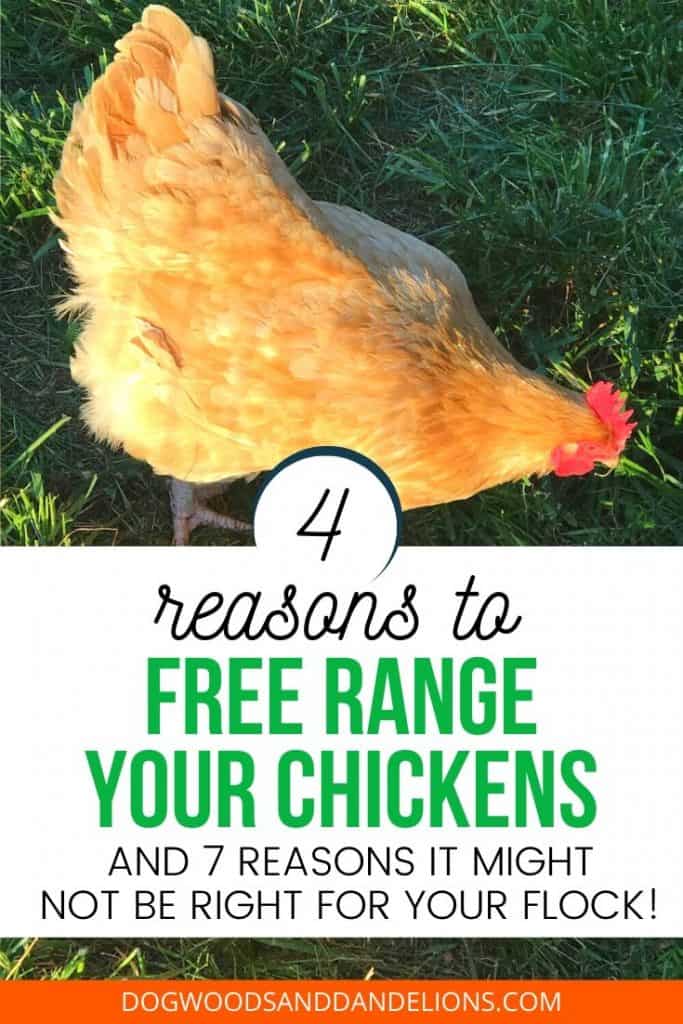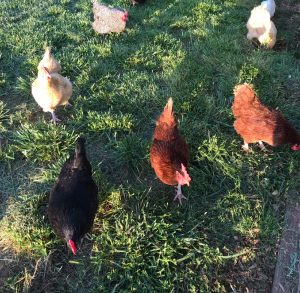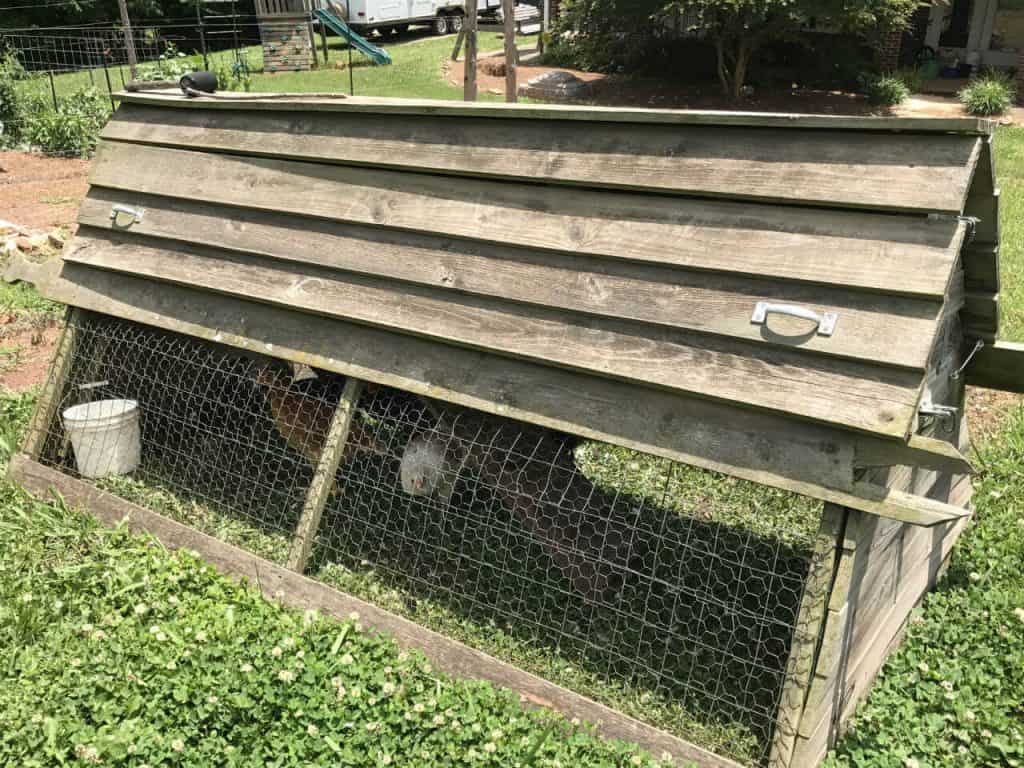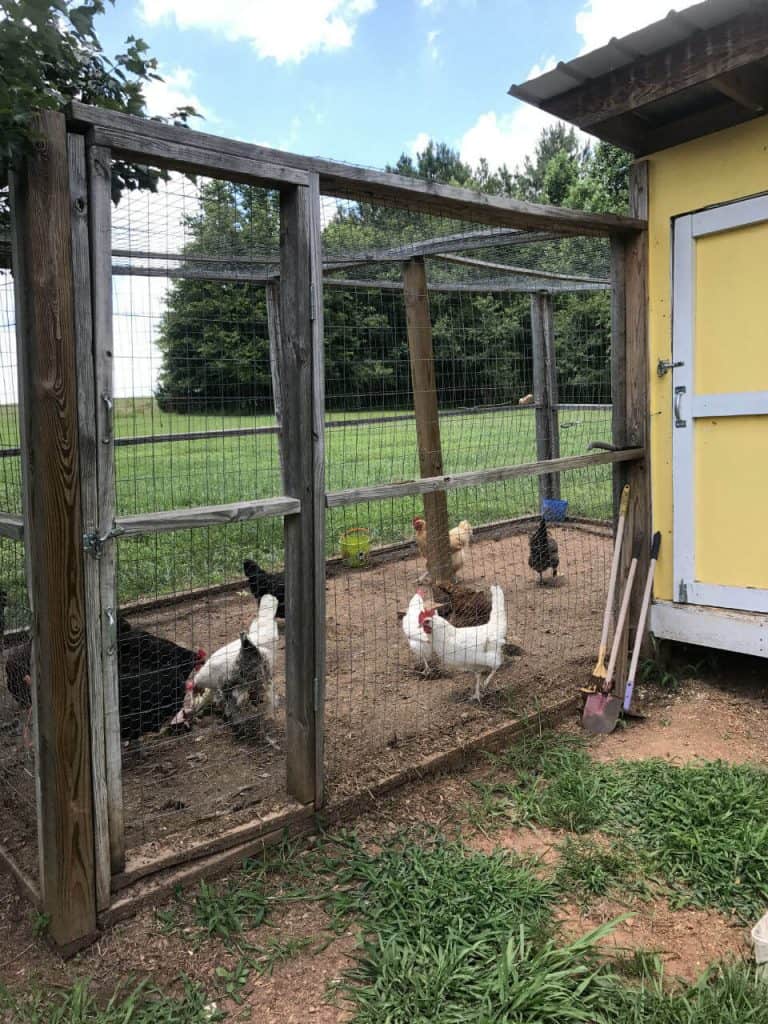4 Benefits to Free Ranging Chickens
Inside: Learn the benefits to free ranging your chickens so can decide if it is right for your flock.
There are many benefits to free ranging chickens. However, there are also some risks involved. You will have to weigh the benefits against the possible risks and evaluate your tolerance for loss. Here are some of the pros and cons of letting your flock free range.
What Does “Free-Range” Actually Mean?
First, let me explain what I mean by free range. By “free range” I mean totally letting your chickens out to roam freely, not enclosed in any sort of fence or only enclosed in chain link or privacy fence. (Chain link and privacy fences will NOT keep out most predators nor will they keep most chickens in!)
At a minimum, most experts recommend that backyard chickens have access to an outdoor area where they can scratch and peck and roam around. At least 10 square feet of outdoor space per chicken is the usual recommendation, so for 6 chickens, you would need approximately 60 square feet.
If you don’t plan on allowing your chickens room to roam freely, you will need to build an enclosed run that meets these requirements. Hopefully, these benefits (and downsides) to free ranging your chickens will help you make an educated decision for how to handle your flock.

Now that we’ve gotten the terminology out of the way, we can dive into the benefits to free ranging your chickens.
Affiliate Disclosure: Please note that some of the links in this article may be affiliate links and I may receive a small commission if you purchase something through a link. It will not change your cost. As an Amazon Associate, I earn from qualifying purchases. For more information, see my disclosures page.)
Benefits of Free Ranging Your Chickens
The number one reason to let your flock free range is that it usually means better health for your chickens. Free ranging allows your chickens to be outdoors scratching in the dirt. That’s what a chicken is supposed to do.
By allowing them room to roam, they don’t get bored as easily. You are less likely to have chickens pecking at each other because they have room to get away from a bully. They also have other things to peck at such as weeds and seeds so they don’t get bored.

A second reason to let your flock free range is that the egg quality will be better. Chickens are meant to eat bugs and weeds and scratch in the dirt. Those deep yellow-orange yolks come from chickens that have a varied diet. That’s why store-bought eggs are so pale.?

By choosing to let your chickens free-range you will also probably spend less money on feed. While you should still feed your flock chicken feed, they will get some of their nutritional needs from the weeds and bugs they eat.
Another benefit to free-ranging your chickens is that because they are not confined to a small area, your flock is less likely to come down with diseases. Just as more people get sick during the winter when they are cooped up indoors, chickens are the same way. Spending lots of time outdoors is good for everyone!
A bonus reason for allowing your flock to free-range is that chickens are just plain fun to watch. They each have their own unique personalities and watching your chickens putter around your yard is a wonderful way to spend an afternoon.
Downsides to Allowing Your Flock to Roam Free
The biggest downside to letting your flock free range is the possible loss of chickens to predators. Depending on what animal threats you have in your area, hawks, coyotes, raccoons, opossums, and foxes all like to make a meal of your chickens.
If you have a good dog that won’t bother your chickens, you may be able to free range them with the dog outside to keep watch. Keep in mind, chickens are prone to wander away so a dog can only cover so much ground.
Another downside to free ranging your chickens is that you may have to search for eggs. Many chickens will return to the coop to lay, but you will sometimes get a stubborn one or two that will choose to lay elsewhere.
Another thing to think about before letting your chickens roam freely is that chickens poop EVERYWHERE. They will poop in your yard, on your walkways, even on your porches.
We once had a chicken that would sit on our windowsill every night while we ate supper. But we finally stopped that as she was pooping all over it.
No matter what you do, your chickens should always have a secure coop to spend the night in.
Other Things to Consider Before Free Ranging Your Chickens
There are many other things to consider before you decide to free range chickens. Many of these depend on where you live and what kind of yard you have.

Will the Chickens Be Safe?
If you live near a busy road, I would definitely be cautious about free ranging your chickens. A three-foot chain link or privacy fence will not keep chickens inside. Most breeds can easily fly over something that low.
A chain link or privacy fence will also not keep out raccoons and opossums. And while they aren’t usually out during the day, it is possible, especially if there is a rabid one around.
Something else to think about is other dogs. We live in a rural area and occasionally have a stray or lost dog come through. One day I came home to find my chickens acting upset. (They were safely locked in their coop and run.)
Upon closer inspection, I found paw prints on my coop. A stray dog had come through and tried to help himself to a meal of chicken. Luckily, my husband built sturdy coops. (Yes, coops. We have two. Read more about why we have 2 coops here.)
Will The Chickens Bother Others?
Neighbors are another consideration in whether or not you free range your flock. Chickens will roam a fairly large distance so you don’t want them bothering others. We have a fairly large yard so I did free range ours for a while.
But we have a small strip of woods between us and our neighbor and the chickens loved to hang out there. Then they started visiting the neighbor’s yard every time we let them out. (Apparently, they have better bugs than we do.)
While our neighbors never complained, I decided that I preferred to stay on good terms with them, so we quit letting ours roam free. I didn’t want my girls pooping on their porches too!
Do You Have a Garden?
If you have a garden, you may want to think twice about free ranging your flock. The chickens love your fresh produce as much as you do. And while you might not mind the fact that they occasionally steal a tomato or two, that isn’t the only problem.
Instead of eating one or two tomatoes, they will take a bite out of one tomato and another bite from a different one. They see your garden as a buffet!
Chickens will also eat young seedlings or scratch them up trying to dust bathe. If your garden isn’t fenced, I would highly discourage you from letting the chickens free. (Thinking about fencing in your garden? You can read about how we keep critters as well as chickens out of our garden.)
And if your neighbor has a garden that isn’t fenced? Yikes? Letting your flock free range is a recipe for unhappy neighbors.
Do You Keep Roosters?
If you keep a rooster, you might have better success at free ranging your chickens. Oftentimes a rooster will alert the hens that a predator is near.
Many a rooster has given his life to save his girls. However, a rooster is still no guarantee that the hens will be safe. And he won’t keep the girls out of the neighbor’s yard either.
How We Manage Our Flock
Our chickens have a large coop and a totally enclosed run. This run is made of 2″ x 3″ wire covered with a second layer of chicken wire. When we built our run, it was actually cheaper to use this double layer of wire than to purchase 1″ hardware cloth.
Our run is also covered across the top with the same wire so that hawks can’t sweep in and grab a chicken or raccoons can’t climb in at night.
While at home, we allow them to “free-range” in an enclosed area (pen). This area is not totally safe from predators but they are only allowed access to this when we are home and we would most likely hear the chickens if something was bothering them.
A hawk could possibly still get a chicken or a stray dog could feasibly knock the wire down and get in, but it is a risk we have chosen to accept for the health of our chickens and to improve the egg quality.



With a small flock you can build a chicken tractor and move it every few days. This is what we did with our initial flock of 6 chickens. And while we love that setup, we now have 2 dozen hens so it’s not a practical option.
Some people also do “supervised” free ranging, meaning you only let your chickens roam when you are at home or outside to supervise them. However, this is still not 100% safe. A fox or coyote can still sneak in and grab a chicken while you are close by.
Many predators will scope out a place and look for the best opportunity to snatch one of your feathered friends. If you choose to do supervised free ranging, vary the times of day you let them free. Otherwise, you are allowing the predators to know what time the chicken buffet will be ready.
Should You Free Range Your Flock?
Just as there is no one correct way to raise chickens, there is no easy answer on whether you should free range your flock.
You have to decide whether the benefits of free ranging your chickens are worth the risk. You need to think about your risk tolerance and weigh that against the threats in your area. It all really boils down to how upset you are going to be if you lose a chicken or two.
Learn More About Raising Chickens
- What predators you might need to watch out for when raising chickens?
- For more information on our two coops read how we use two to manage our flock.
- If you need more information on raising chicks, here’s what you need to include when you build your coop.
- You can find out when it’s safe to move your chicks to the coop right here.

Meet Julie
I’m a farm girl born and bred in North Carolina. I’ve been growing a vegetable garden for over 20 years (and helping my Mom grow hers even longer). I’ve been raising chickens in my bathtub and backyard for 12+ years. I believe that homegrown food can be made simple. Let’s get started.

